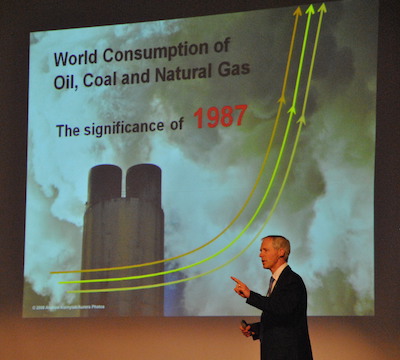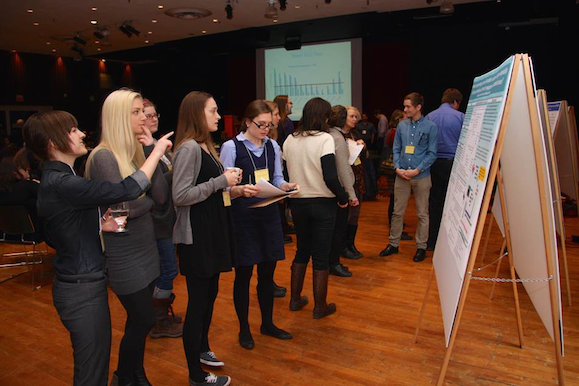News
» Go to news mainFocus on the climate at Information Without Borders conference

Carl Duivenvoorden delivered the closing keynote of the 2015 Information Without Borders Conference (Photo: Colin Craig)
The McInnes Room of Dalhousie’s Student Union Building was full of attentive listeners as Carl Duivenvoorden delivered the closing keynote of the 2015 Information Without Borders conference. Entitled “Beyond an Inconvenient Truth: From Emergency to Action,” Mr. Duivenvoorden’s speech outlined the effects of human consumption on climate change.
A talk on the environment might seem like an unusual choice for a conference about information management, but it fit right in with this year’s topic, “Information Management for Climate Change Adaptation.” Mr. Duivenvoorden and other presenters discussed how we record, organize and communicate information about climate change. Information Management students Hilary Lynd and Jennie Thompson, co-chairs of the conference, explained: “In the field of Information Management, we support and facilitate the research and work of many fields. In order to identify positive solutions for our Earth, interdisciplinary knowledge needs to be applied. … [W]e invited our conference attendees to consider the significant role that information management can play in turning research into action.”
Dr. Louise Spiteri, Director of the School of Information Management (SIM), elaborated on the relevance of information management to environmental issues. “Strategies and policies to manage efforts to adapt to climate change require a great deal of information resources,” she said. “Proper and efficient management of these information resources is critical to ensure their availability and their preservation.”
Besides Mr. Duivenvoorden, conference attendees also heard Professor Steve Easterbrook of the University of Toronto speak on “Computing the Climate” and Megan Leslie, MP, speak about “Climate Change and Public Communication,” among others. SIM students participated in a poster competition, and some lectured on their research. Dr. Spiteri noted that the conference guests were impressed with the efficiency and organization of IWB 2015, and that the presentations were revealing. “The poster sessions and student presentations highlighted not only the excellent quality of research conducted by students in the Faculty of Management,” she said, “but also the multi-disciplinary and cross-disciplinary nature of the Faculty.”
The guest speakers’ presentations also made an impact. “Our speakers pushed us to consider the various roles that we can all play as information managers in better understanding, researching, and preparing for climate change,” said Hilary and Jennie. Mr. Duivenvoorden was no exception. Having worked in the past with Al Gore, he is no stranger to the task of communicating complex information about the climate. Chronicling his formative years in Belledune, New Brunswick next to a smelter and a fertilizer plant, Mr. Duivenvoorden went on to explain the science of climate change, and gave statistics on fossil fuel use, Atlantic Canadian weather records and the melting polar ice caps to a riveted audience. He also imparted a positive message on how humans can slow climate change by improving efficiency and using renewable energy technologies. With his skill in managing and communicating information about climate change, Mr. Duivenvoorden’s lecture provided a perfect example of the conference’s theme.
Below: Judging the poster presentations (Photo: Mariah Blackmore)

Recent News
- Professor M. Ali Ülkü receives 2024 Archibald Award
- Project to address harmful language relating to Indigenous peoples receives prestigious Mellon Award
- Four decades of friendly hellos
- Students speak with passion about recipients of Teaching Excellence Award
- Brothers, and Dal alums, adapt and learn to achieve career success
- Najah Attig and Oumar Sy win prestigious Graham and Dodd Scroll Award
- Curiosity in human behaviour leads Huiyan Liu (MSc’23 ) to a PhD
- In Memoriam – Dr. James R. Barker
